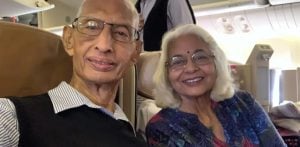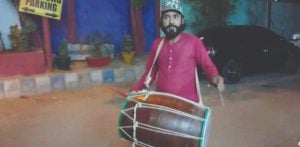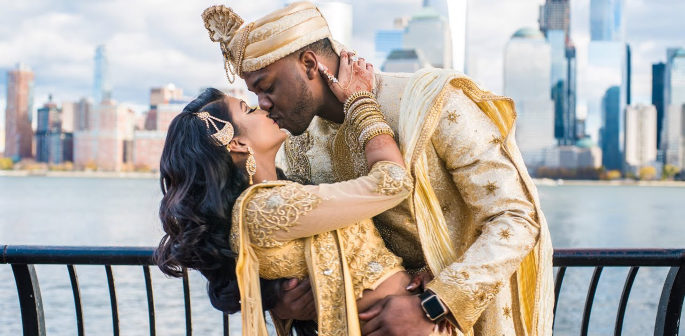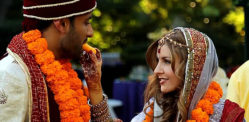Being in an interracial relationship is not a crime
The world is seeing more interracial couples, and the Desi community are no different.
People from the Desi community are choosing to form interracial relationships, getting married and having children. However, this comes with a host of struggles.
For decades, it has been considered the norm by South Asians to only marry their own.
Elders would traditionally select someone, who they deemed suitable, for the younger person to marry. Younger voices would seldom be considered or heard.
The strong influence of parental expectations, societal backlash and the constant loud murmur of “What will people say?” has caused many love-struck couples to drift apart.
Some fear disappointing their parents and view the consequences as too dire.
However, in recent years, the younger generation is beginning to care less about what people think. After all, they are living their lives for themselves.
Many are refusing to choose between being with the one they love and walking away from their families. Instead, they give that choice back to their elders.
Eight love-struck interracial couples share their stories with DESIblitz. They discuss how their unique unions came about despite the cultural differences and familial hurdles.
Tevin & Saba
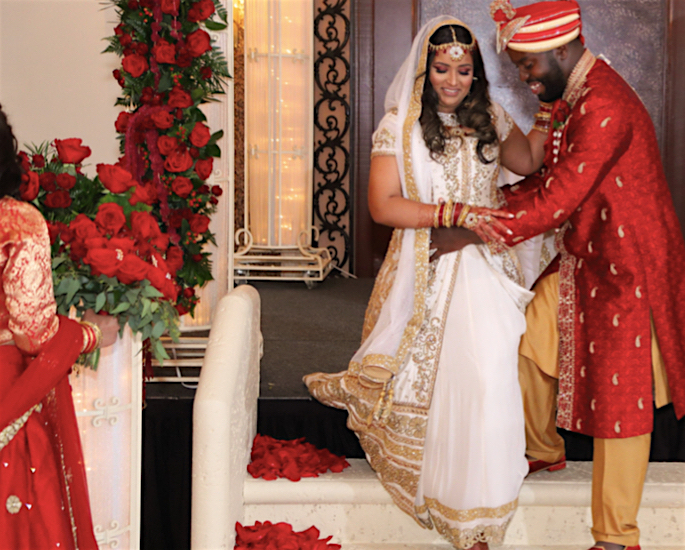
Length of Relationship: 7 years together and 1 year married
Cultural Background: Black American and South Asian
Saba, a South Asian woman married to Tevin, a black American told DESIblitz about her initial apprehensions of their relationship. She explained:
“I felt as though I was betraying my family and that I will be disowned choosing to stay with Tevin.
“But in the beginning, I was not too concerned with it because we were friends first and then became close to where our differences did not matter anymore.
“I truly believe we belong together like two puzzle pieces that fit perfectly, see we are humans first then we are separated by race and/or religion.”
This wasn’t always the case for Saba. Growing up, interracial relationships were rarely represented and when they were it was always negative.
“Relationships was presented in a confusing manner,” says Saba.
“On the one hand, I grew up watching Bollywood movies where grand romantic gestures were made, and the girl and boy ended up together despite all the adversity.”
Unlike the fairytales of film, being part of a Muslim family meant that Saba was told love and romance occurs after the wedding and not before.
Regarding race, marrying someone outside of the South Asian community was simply wrong and out of the question.
Saba recalled her female cousin who ultimately ran away from home with her beloved.
Consequently, she was not talked to for 10 years.
With this in mind, it is clear to comprehend why many South Asians refrain from talking about the taboo of interracial couples.
On the other hand, Tevin did not have such apprehensions. He revealed:
“My mama did not care so I didn’t care. I knew eventually we will need to discuss religion and cultural backgrounds but, in the beginning, I didn’t have any apprehensions.”
They both knew it was love but for Saba, it would be difficult to reveal this to her family:
“I did not get to introduce Tevin properly to my family in the beginning. When we were just starting out and not that serious my parents found out about our relationship and well let’s just say they were not really pleased.
“They dismissed the idea of ever meeting Tevin and saw no need as I wasn’t going to ever marry him. They were going to force me not to.”
When the couple did become engaged, Saba tried to reintroduce Tevin to the family.
However, her dad’s side was threatening and tried to break them up. It was the support of friends who “knew and loved Tevin” who supported the couple.
Currently, Saba’s mum still talks to her and is “coming around to Tevin.” As Saba notes:
“A mother’s love does not change, the mind might be angry but the heart will eventually forgive.
“We plan to, with the help from my sister and brother, reintroduce Tevin to my family.”
Tevin’s family is very loving and supportive of them as an interracial couple:
“Every single person in my family loves Saba and supports her, neither Saba’s race nor her religion mattered. They loved me and knew I loved Saba.”
Despite still receiving many stares from other people, Tevin and Saba seek to create a supportive community of both Black people and Desis for their future children.
Is it right to restrict love to a particular race or ethnicity?
Tevin is a firm believer that love will conquer all:
“It is this conceit that will comfort you when you confront some of the potentially bitter and bigoted bystanders that have no empathy, no joy.
“Nonetheless, if your family is made up of the people who were instrumental in bringing you up with love and patience, then you know that eventually, it will all work itself out.”
Saba echoes this sentiment in stating that:
“Being Desi I know it is a scary thought going against the entire family but if it is true love, you fight for it, and work towards being a great big family.
“For me, it was not until I reached out to a therapist to even have the courage to reintroduce Tevin again. It will be a long journey but there will light at the end of that tunnel.”
Although there have been familial struggles, Saba believes that their interracial marriage “is a symbol where love has conquered all.”
Saba questions:
“If our generation does not question and challenge our societal norms then who will?”
Love evidently should not be restricted. It can open new doors and provide new perspectives on life.
Tevin’s favourite things about being a part of an interracial relationship are continuously learning something new about each other and the culture.
Tevin and Saba hope that recent events around the world provide people with greater perspective:
“Life is too short and too unpredictable to not pursue your passions as well as who you are passionate about, regardless of societal expectations,” Tevin says.
Race, religion or ethnicity shouldn’t matter. Understanding of these helps people be more empathic.
Being in a love-struck Desi interracial couple can be extremely tough. Some lose their families over it, some gain families. Others continue to work hard at creating a generation of acceptance.
Andy & Mehr
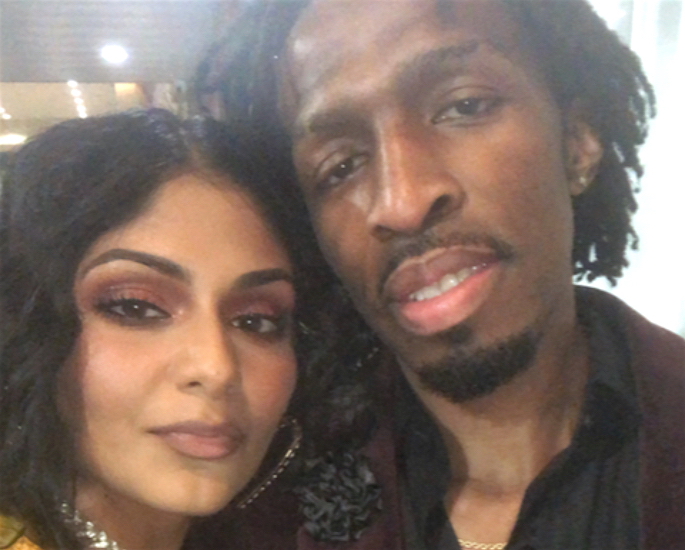
Length of Relationship: 1 year
Cultural Background: Nigerian and Indian
Another love-struck interracial couple from the USA, Andy and Mehr, have been together for one year.
They have managed to find the balance between their cultural differences. Andy tells DESIblitz about his initial feelings for Mehr:
“I didn’t have any apprehensions about the relationship in the beginning. I knew I had strong feelings toward Mehr and that we connected.”
Mehr equally had no apprehensions, especially those relating to Andy’s racial background:
“I knew the qualities I wanted in a partner and none of those were related to race.
“We were raised with similar values, had high ambitions for ourselves and wanted to be the best versions of ourselves.
“Knowing that we shared foundational values made it easier for us to pursue this relationship.”
There are many western couples that can mix their cultural traditions into the modern world with few problems.
Many families are much more open to the idea of interracial relationships; others have open concerns.
Despite having different religions (Christianity and Hinduism), Andy and Mehr appear to have achieved this equilibrium.
Andy notes:
“I was wary of her family accepting me at first. This uneasiness was quickly displaced once I got to meet her parents.”
Often the privilege of not being questioned on your relationships is only extended to the male children in South Asian households. This sentiment extends to Andy who says:
“I believe being the oldest male grandchild has presented me with the privilege of not having family members question my relationship choice.
“I do anticipate that some of the extended family might have some questions that they may share among themselves.”
Both sets of parents had seemingly positive reactions to their interracial coupling.
For Mehr, it was important that everyone knew and liked one another, given her close-knit relationship with her parents:
“It was important to me that my parents saw in Andy what I saw in him – a caring and intelligent man.
“Prior to introducing my parents to Andy, I had multiple conversations with my parents about why I see Andy as my future husband.
“I explained how supportive and ambitious he was to reinforce that we shared the same values.
“My mum was on-board immediately but my dad, an Indian Army veteran, was hesitant. He felt that I would lose touch with my culture if I married someone outside of my race.”
Mehr understands that modern relationships don’t require couples to choose one culture to identify with.
Not every couple must convert to one faith and discard the other entirely.
“The first meeting was a success and Andy has met my parents several times since then!” says Mehr.
Sounds sweet and quite simple? Well, Andy and Mehr are both prepared for future judgement and hardships:
“I have yet to tell the extended family about my relationship which I know will garner questions on my judgement.
“However, I stand firm in my decision and know that I can tackle these obstacles with consistent communication”, says Mehr.
Patience seems to be the key to encouraging others to evolve their viewpoint – one that they’ve been taught their entire lives.
Andy says:
“If they love you and want to be part of your life, they will meet you halfway. Tackling the biases that they might have will aid in this process.
“You have to be firm in setting the standard, that you won’t tolerate disrespect of your partner.”
Mehr agrees with this notion of patience, especially when it comes to parents who grew up in South Asia.
The age-old tradition of arranged marriages meant that South Asians were not exposed to romantic relationships a lot during childhood, much less interracial relationships.
Mehr encourages people to:
“Explain your points in the simplest way possible and don’t accuse them of being “racist” especially if your parents were born and raised in South Asia.
“Practice patience in conversations and be informed so you can bring up counterpoints to their biases with facts and figures.”
Asking family members what is fueling their emotional response is crucial to finding a balance.
Elders in the South Asian community often fear losing the connection to one’s culture or homeland.
Society has dramatically changed since the older days and the support from both Andy and Mehr’s parents showcase this fact.
When asked what his favourite thing about being part of an interracial couple is, Andy says it is:
“Being able to share my Mehr’s experiences and culture. I believe some of the best tools to combat biases are firsthand experience and open conversations.
“It is easier having those deeper conversations about race and biases when you’re in a serious relationship.”
Mehr similarly responds that she loves being able to have educational conversations with her partner about their cultures:
“This has broadened my worldview and allowed me to further evaluate my personal biases and step outside of my ideological viewpoints.”
When looking to the future, Mehr notes:
“We have discussed our individual religions (Christianity and Hinduism) and how to teach our future children the importance of both sides of their identity.
Having open and honest conversations about difficult topics is central in making an interracial relationship work. But not all couples have this advantage.
Delroy & Ravinder
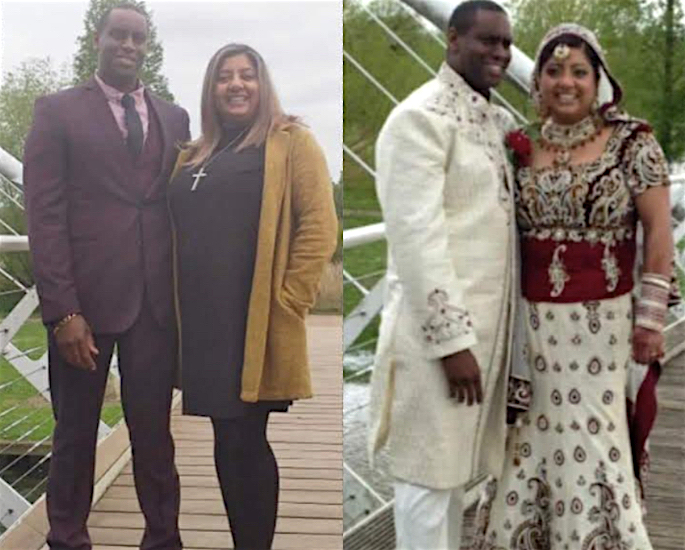
Length of Relationship: 13 years together, married 8 years
Cultural Background: Jamaican and Indian
Delroy and Ravinder, a married couple from the UK, began dating in 2007 and were privy to many prejudices and derogatory terms are thrown their way.
As a woman growing up in the Hindu, Sikh and Punjabi culture, Ravinder was always taught that you should stay within your own ‘race’, caste and culture. In terms of marriage, only arranged marriages were customary.
Therefore, the acceptance of multicultural relationships due to heritage and familial values would be a difficult road to travel.
Anyone who crossed this boundary would usually be seen as an embarrassment to the family, a rebel and someone who disrespected their culture.
Ravinder says:
“Often interracial relationships were frowned upon and sadly I believe that this thought process has been ingrained and permeates throughout the ethos of some households and families.”
The Desi person from the interracial relationship is usually expected to feel a dire sense of shame.
Even after being together for 13 years, Ravinder and Delroy still hear judgmental comments from the South Asian community:
“I speak Punjabi fluently, therefore, understand when derogatory comments are made.”
In most Desi families, bringing home a partner from a different race meant that you would be disowned.
In some cases, the person would be embraced, or rather tolerated, mainly because they had embraced Asian culture fully.
Ravinder recalls the one interracial relationship she remembered growing up:
“One Indian woman had a ‘white husband’, this was a very taboo issue for an Indian female to be engaged in such a relationship.”
Conversely, race and relationships weren’t presented in the same way to Delroy.
For him, there were mixed heritage children in his extended family, so it was something that was simply accepted.
Prior to introducing one another to friends and family, Ravinder was aware of the difficult journey ahead given her upbringing and knowledge of community and culture.
Would they be ready for the battle?
For Delroy, his only apprehensions were regarding senior members of Ravinder’s family. He was always taught to be confident and care less about what others thought.
Alternatively, Ravinder was anxious about the reception their relationship would receive.
Like in many Desi households, interracial relationships were no longer a new concept. However, they were not a subject that was broached without great hesitancy, particularly with women.
Interracial couples can usually expect a journey of isolation and alienation from those closest to them:
“I was ostracised by some for a number of years”, recalls Ravinder.
“I met Delroy at church and for me, it was, that we were of the same faith. We had one understanding, a shared commitment to God in which I was confident would be our foundation.
“It is this foundation that has kept us steadfast, enduring long-suffering and being able to withstand judgement based on race.”
This strong foundation between the couple has remained throughout the years. However, it was not readily accepted by all.
Whilst Delroy’s family were welcoming, Ravinder’s took longer to come to terms with their union.
Ravinder says:
“I am confident that this introduction would have proved easier if he was not Jamaican but English or even European … regardless there was going to be some resistance.”
This alludes to the colourism and anti-black narrative that has prevailed in much of the South Asian community for decades.
Delroy notes some of the stereotypical remarks that he has had to rise above:
“Delroy’s alright, he’s not like the rest of them.”
Not reacting to such comments and covert racisms is something of an achievement for him.
Does every one of all ages react like this?
Younger generations are generally better than elders, although this isn’t always the case.
Often, if the parents of the couple are resistant then the extended family will follow suit.
Some people hold on to this angst long after the novelty of the situation is worn; others move forward.
Ravinder says:
“I think reactions are still very fluid. This is the same with regard to trials and tribulations, conflicts between social groups or events can contribute to how some will treat you as a couple or how they treat your partner – that, ‘they’re all the same attitude’ can emerge.
“He can be seen as a thug, me as loose, immoral or a sell-out.”
While tension reduced after the couple married and had children, there is still a difficulty.
“Surprisingly we are much better received by my family in India. There is a greater acceptance – language being the only barrier between Delroy and them”, notes Ravinder.
This brings into question why South Asian families living and working in the UK are less accepting than people living in the homeland?
Do Desi families in the UK risk falling behind modern times?
Georgina & Aqeel
Length of Relationship: Exclusive, long-term relationship for 1.5 years
Cultural Background: White British and British Indian
In many South Asian households, children are taught it is only acceptable to marry someone from your own religion.
In many minds, this does not include interracial relationships since it can be unfathomable that people of different races might be of the same faith.
For Aqeel, his family was fairly religious and always said that he should be with someone of the same religious beliefs and from a similar background. He says:
“I knew of a few older cousins who had married people who had converted to Islam but most of the time it was frowned upon to marry someone who wasn’t Muslim.”
From a young age, Aqeel was taught that dating was wrong, and you should wait until marriage for any sort of relationship.
So, when he met Georgina at university, he did have some apprehensions before introducing her to his parents.
“I was nervous at first, but I knew Georgina’s character would shine through.
“My parents quickly realised that she had a great personality and saw how much we cared about and for each other.
“It helps that Georgina brings out the best in me and pushes me to be the best I can (which I hold very highly in a relationship, as do my parents) which helped my parents to overlook their cultural views.”
Growing up in a mostly white village and attending schools where other ethnicities were in the minority meant that Georgina didn’t grow up with much of an understanding of other cultures and religions.
Nonetheless, Georgina was not apprehensive about being part of an interracial couple because they are different ethnicities and cultures.
Rather, her apprehensions derived from what most new couples are nervous about:
“What do his friends think of us being together? Will his family like me?” and so forth.
When introducing Aqeel to her parents, Georgina says:
“My family reacted very positively to our relationship and are very open to learning and challenging any preconceptions they had about Indian or Muslim culture.
“My dad particularly enjoys getting food tips or recipes from Aqeel’s family so he can improve his cooking skills.”
Georgina also mentions that some of her family still struggle to spell Aqeel’s name without a ‘u’ after the ‘q’:
“That’s just because of their familiarity with English spelling and they don’t mean any harm.”
Despite growing up in a strict Muslim family, Aqeel also grew up seeing many interracial relationships since he lived in a very culturally diverse area.
This meant that he did have a very open view and understanding.
The primary concern for him was to make sure the person he is dating is open to accepting and learning about his culture:
“I personally couldn’t be with someone who is unable to accept me for who I am and that has to include my cultural background.
“What I found really attractive was how open and interested Georgina was about me and my background whenever it came up.”
Aqeel further details that while his parents have come to really approve of their relationship, they are still concerned about other family member’s reactions.
This illustrates the work yet to be done in evolving the age-old view of interracial couplings.
But how do Georgina and Aqeel tackle any cultural or linguistic differences?
“My parents having been born and raised in the UK and having both gone to universities, are fairly western so my upbringing was a mix of British and Indian cultures.
Georgina has been so open about learning and taking an interest in my cultural which I something I really love about her”, says Aqeel.
When discussing the future and the possibility of children Aqeel feels that it would be important to have them understand and appreciate both cultures:
“We have had conversations regarding this and it’s great to know we both have similar views.
“I would feel uncomfortable if I had children who didn’t understand where their family came from or why they do certain things.”
A major reason why this couple has worked so well together is that they have embraced this journey as a team.
Georgina says:
“It is good to communicate with your family…as long as you’re willing to address them in an open and trusting space.
“Sometimes our assumptions about certain ethnicities and cultures are wrong.”
“I think it’s helpful to address different areas of your culture at different times rather than taking on too much information all at once, which can be overwhelming and difficult to learn/navigate.”
Although many South Asian households find difficulty in openly talking about taboo topics, it is clear to see that doing so is very effective.
Georgina also mentions a key factor of natural bonding experiences:
“People naturally bond over food so sharing food customs and recipes is a great way to share aspects of your cultural experience!”
Georgina and Aqeel have managed to find a good balance between their cultural differences.
Their thoughts and feelings on interracial relationships emphasise the importance of accepting and adapting to your partner’s culture while maintaining your own.
Aqeel advises other interracial couples to believe that the people who care about you most will always support you, even if it takes a little time.
He says:
“Try to be confident about it, open discussions in a safe environment are healthy and it is good to learn about new things.”
Combining different cultures to create something new and exciting is an adventure and should be enjoyed!
Remaining forgiving about unintentional mistakes and working together to show families the fantastic qualities of your partner should override any concerns they may initially have.
Aakanksha & Dogus
Length of Relationship: 2 years
Cultural Background: Indian and Turkish
Aakanksha and Dogus, both aged 22, have been in a committed relationship for two years.
Aakanksha is from a traditional Indian family who was raised in the UK whilst Dogus is from Turkish heritage and born and raised in the UK.
Growing up watching Bollywood films, Aakanksha was privy to watching a lot of romance novels which shaped her view of relationships.
She always imagined she would end up marrying an Indian man and didn’t think her parents would approve of anyone else.
On the other hand, Dogus was always told he could be with whomever he wishes as long as they are a good person.
This made telling friends and family about their relationship much easier for Dogus.
When Aakanksha did have the courage to tell her family about Dogus, she was already quite deep into the relationship.
Societal prejudices meant she was quite hesitant, but their strong bond meant she was sure her parents would accept him.
“I still sometimes feel that they would prefer an Indian guy but then again, I am the one in this relationship”, she says.
An obvious obstacle with interracial couples is the language barrier.
Often, parents are concerned that the partner of their child will not fit in well because they cannot speak the same language.
Perhaps senior family members will not be able to verbally communicate at all.
Aakanksha recalls a time when this situation arose:
“When we were all sitting together, someone spoke in Hindi and he could not understand. You do it unknowingly, but I feel it made it harder to bond.”
She feels that perhaps introducing your partner quite early on can make bonding with family slightly easier.
A primary concern for them is introducing Dogus to the extended family. This is mainly due to religious differences as her family is Hindu whereas Dogus is Muslim.
Religious clashes are often a source of conflict in interracial relationships.
Usually, it is the family members who view it to be a bigger problem than the couple themselves. As the saying goes – love has no language!
Despite this, it can feel alienating when you and your partner do not share a mother tongue.
Aakanksha says:
“It does get a bit exhausting sometimes as you do not know what the other person is saying when speaking in their own language, you feel you are missing out.
“He listens to Hindi music/watched Bollywood films and loves Indian food.”
Getting involved in the cultural aspects of one another’s heritage is central in connecting.
For example, Dogus and Aakanksha both enjoy experiencing new cultures and have desires to visit India and Turkey one day.
Furthermore, they have found similarities in each other’s culture. Having good values and similar morals is something they hold close to them.
As a young couple, Aakanksha and Dogus are well aware of the discrimination and prejudices they face in the future. This is part of the reason why they haven’t told extended family members yet.
Aunties, uncles and grandparents alike all have a very traditional and backwards way of thinking. Dating outside of one’s race for them is forbidden.
Should other people’s opinions matter?
Some couples either ignore opinions altogether, possible even leaving their family altogether in pursuit of love.
Others brace themselves and choose to address people’s misconceptions in the quest of keeping the family united.
Aakanksha advises other interracial couples to tell their loved ones as soon as possible:
“Do not assume the worst. Your family hopefully have good intentions and want the best for you. Tell them in advance to avoid any drama and pain later along.”
Dogus has a very positive view of interracial relationships and believes that if you hold similar values and trust one another then that is a recipe for success:
“Just believe in your partner and your future with him or her.”
Once you do cross any barriers there are many benefits to be enjoyed.
“She teaches me new things about Indian culture that I did not know about. Also, I love Indian food so eating at her house is a blessing!” Dogus says.
There is a learning process that happens that you cannot get inside a classroom.
One of the hardest, yet most rewarding, things is learning so much about the other race through traditions, language, family, food and more.
As Aakanksha says: “You literally experience the world through someone else’s eyes and see it all from a different perspective.”
Shafia & Adam
Length of Relationship: 1 year married
Cultural Background: Pakistani American and Caucasian American.
Another love-struck interracial couple from the USA, Shafia and Adam, married in 2020.
Speaking to DESIblitz about her knowledge of interracial relationships, Shafia says that growing up in Long Island, New York meant that there were lots of races and religions around her.
However, she only knew of one person who was part of an interracial couple.
The notion of love was presented to Shafia in a simple way: get married young and grow with your partner. This partner was, of course, imagined by elders to be Pakistani.
So when Shafia met Adam she wanted to make sure that what they had was real and would not be a temporary relationship.
She knew she wanted a serious relationship and had not connected as well with someone from the same cultural background as she did with Adam.
It wasn’t until Shafia and Adam understood they would eventually marry each other that she told her mother. Shafia tells DESIblitz that this did bring a small hesitancy:
“My mum was hesitant at first only because speaking to her hypothetically about marrying someone of a different race and then presenting them to her are two very different things.
“At the end of the day, she trusted my decision and gave us her blessings.”
How has Adam adapted to parts of Pakistani culture?
“I’m always teaching him things about Pakistani culture here and there as well as how my family does things.
“I’m also constantly translating between my husband and my mum. My husband is starting to learn Urdu little by little, but I think a trip to Pakistan will bring him up a few levels.
“He loves Desi food but with a mild spice level! My husband is very open to learning about my culture and embracing it.”
Many young couples are unsure of when to tell their parents about their partner. When is the best time?
For Shafia, she believes it is always best to start the conversation early:
“Once you’ve realised that you prefer someone outside of your cultural background bring it up to your parents. Bring to light the positives and similarities.
“Talk to your parents about different cultures and people of those cultures.
“Then once you have found your person tell them and if they say no and say they don’t approve, question them.
“Don’t argue, that conversation goes nowhere. Ask them if they trust you.”
Pressing for a real reason as to why they think someone is not right for you without meeting them is important. It should create a dynamic conversation and understanding on both parts.
Being in an interracial relationship is not a crime. While many people sometimes treat it this way, it is vital to remember there is nothing wrong with it.
Continuing to educate people of any biases they may have is a necessary step in achieving racial equality.
Sonia & Joe
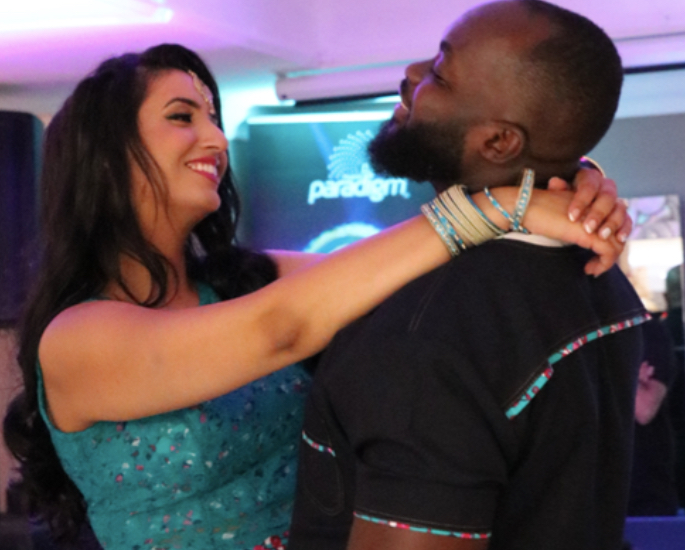
Length of Relationship: Together 6 years and married 2 years
Cultural Background: British Indian and Ghanaian
Another married interracial couple from the UK speaks to DESIblitz about their experience.
Blindian (Black and Indian) relationships were uncommon when Sonia and Joe first met.
Colourism was – and still is – rife in the South Asian community with lighter skin colour being seen as superior.
Black people were therefore viewed by many as inferior and anyone who started a romantic relationship with someone who was black was disowned.
Your family might never speak to you again.
Given these racist prejudices, Sonia imagined herself to marry into a large Asian family where she would serve her in-laws. After all, that is the reality for most Desi girls.
Sonia’s strict upbringing and lack of autonomy to date a person of her choosing meant that the couple faced a lot of rejection at the beginning.
She says that there were many prejudices that stood in the way of a smooth introduction to the family:
“African men are unfaithful and will not stick around” was a common point that people tried to say.
Their union was not accepted at first which Joe says made him feel like Sonia would “give up due to family pressures.”
Luckily the couple’s love outweighed the adversity they faced, and they have had started a happy marriage.
Family members have slowly come to terms with their union given that they can see their relationship thriving.
Some parents find it difficult to accept an interracial relationship because they want the best for their child – and to them, this means being from the same race and ethnicity.
However, when Sonia’s family saw them progressing in life and reaching milestones together e.g. starting a business, buying a home, they were able to communicate better and be more friendly.
Adapting to familial cultures is important in helping to connect with friends and family. Joe notes:
“English is our first language, so it helps for us all to connect. We have picked up some of the common phrases in each other’s languages to connect with families and friends.
“Our mutual faith helps us tackle the differences.”
But what if the family cannot get over the differences?
Sonia and Joe both agree to follow your instinct and never give up. They say that you should always have each other’s back.
Maintaining a united front will show those who disagree with your relationship that this is the real deal. Fight whatever it is together and stay strong.
Sonia says:
“It is so important to have a common goal and understand that you share the same values and belief systems so when going through the trials you got each other to lean on.
“Friends and family will convert eventually but all eyes are on you and your love will be tested.”
Being part of an interracial couple in a society that is not free from prejudice and racism is not easy. Though, for many couples, their love and the strong bond can overcome anything.
Vivian & J Robinson
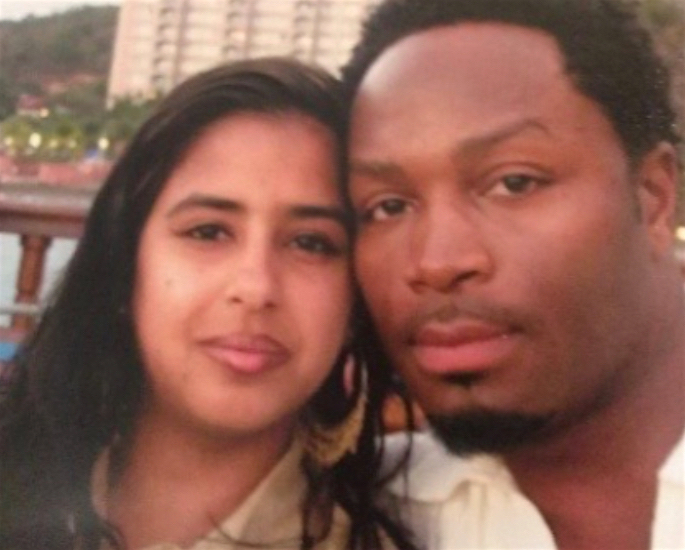
Length of Relationship: Married for 14 years
Cultural Background: Punjabi/Sikh Indian & African American and Native American
Last of all, Vivian and J have been married for fourteen years. Over the course of their long-term relationship, they have experienced a lot of positives as well as hardships.
Their feelings toward one another were very strong from the start:
“No one was going to stop what God had brought together. We knew we were each other’s destiny”, says Vivian.
They had no apprehensions based on what their hearts were telling them. However, they understood that their families would perhaps look twice or pass judgement based on societal perceptions.
Vivian was raised in Canada which was like a melting pot for every nationality, creed and culture.
Vivian says she “never saw colour, only the hearts of my fellow humans.”
Being around such diversity meant she always felt she would marry outside of her race.
On the other hand, J grew up slightly south in Atlanta, Georgia. Vivian says:
“His mother always wanted them to experience more than just being “black” in the South … she wanted her children to love all types of people, regardless of what their skin-tone was, wanted them to have the same privileges and opportunities as those of other colours.”
This meant that they were very thoughtful in where they lived and what schools she sent them too.
Given that J’s grandmother was Native American, culture and diversity lived and breathed in their household.
Having parents who are more open-minded, and even of mixed heritage themselves can make having interracial relationships easier.
This is because it is already quite ‘normal’ and people have previously integrated into the family.
Despite the fact that Vivian grew up in a diverse area, her family were not as open to her being in an interracial couple – particularly on her father’s side:
“My father did not speak to me for almost two years and my siblings also initially distanced themselves. My mum was the only one who supported me and our love from the beginning.”
This sense of loss is a reality for many couples in interracial relationships. There is always the risk of parents no longing communicating with you.
Sometimes a lack of education or tradition is to blame.
As time progressed, both of Vivian’s siblings entered into interracial marriages themselves so their journey became that much easier.
On J’s side, his mother was anxious whether Vivian’s family would accept her son.
“She also thought I was a bit too feisty, which I was and still am! One of the things that J loved and still loves the most,” Vivian mentions.
It is worth noting that her family’s reactions have changed over time:
“They had to respect the fact that we have withstood the hands of time and judgement from all corners and are even stronger today, with our beautiful Blindian son to complete our family unit.”
Having a child in an interracial couple comes with its own set of wonders and challenges.
How do you ensure the child identifies with both sides? How do you integrate different cultures into your daily life?
Vivian says:
“Both of our cultures are important and critical for our son to understand and respect.
“I make sure that I teach him Punjabi and our cultural ways and my husband is teaching him about his African/American and Native American heritage.
“We both take pride in our son having the best of both of these worlds.”
A specific concern for many South Asians is losing the language. The fact that Vivian and J recognise the gift of being bilingual is great because it can only help the next generation grow.
Even J himself knows some Punjabi so “leans in to support that growth with our son.”
It is clear to see that in this case, love conquers all. After all, it is your life and you should be able to choose who you love.
“Your family, friends, the community will always have their opinions and judgements. But you do not need to live in the same house with them, sleep in the same bed with them, nor raise your family with them”, says Vivian.
She, therefore, encourages you to simply do what brings your heart, mind, body and soul joy.
Whilst the older generation have a different view of love and marriage, times are changing.
Many love-struck interracial couples fight for their love. There are still many who don’t win that fight for family pressures can become too much.
Nowadays, interracial couples stand a powerful ground and people are becoming more knowledgeable and fulfilled in the process.









